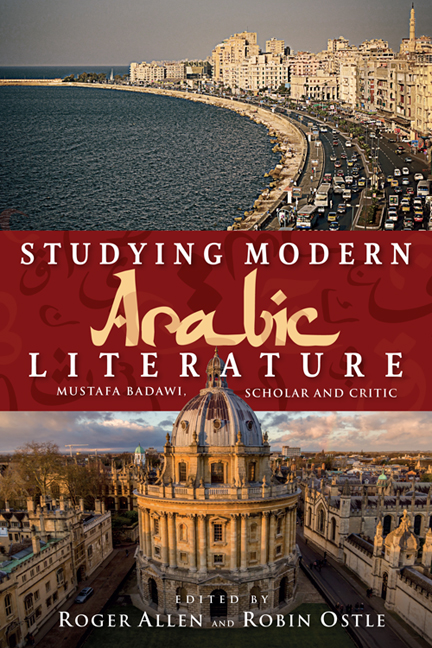Book contents
- Frontmatter
- Contents
- List of Figures
- Introduction
- Part I Alexandria to Oxford
- 1 The Cosmopolitan Alexandrian
- 2 Muhammad Mustafa Badawi in Conversation
- 3 Badawi: An Academic with a Vision. A Personal Testimony
- 4 From the Shadow Plays of Ibn Daniyal to the Poetry of Philip Larkin: Mustafa Badawi as Editor and Translator
- Part II The Academic Legacy
- Notes on the Contributors
- Index
2 - Muhammad Mustafa Badawi in Conversation
from Part I - Alexandria to Oxford
Published online by Cambridge University Press: 05 August 2016
- Frontmatter
- Contents
- List of Figures
- Introduction
- Part I Alexandria to Oxford
- 1 The Cosmopolitan Alexandrian
- 2 Muhammad Mustafa Badawi in Conversation
- 3 Badawi: An Academic with a Vision. A Personal Testimony
- 4 From the Shadow Plays of Ibn Daniyal to the Poetry of Philip Larkin: Mustafa Badawi as Editor and Translator
- Part II The Academic Legacy
- Notes on the Contributors
- Index
Summary
(In 1997, Abdul-Nabi Isstaif conducted an extensive interview with Mustafa Badawi which has not previously been published. We reproduce here the sections relating to Mustafa's early life and education until 1947 when he was sent to England to pursue further studies in English. Professor Isstaif, who has translated the text from the Arabic, hopes to publish the interview in full in 2015.)
ANS: May we begin with the years of your early formation in the family, the neighbourhood and your various schools in Alexandria?
MMB: I was born in the city of Alexandria in Egypt in the year 1925 in a popular quarter. We were a middle-class family, for my mother used to own a flat in the quarter with my grandmother. I grew up in that flat as the only male child among seven children: four elder sisters and two younger than me. My father had a modest education, for he was a craftsman working as a contractor (muqawil), and he did not have a great interest in the education of his children. However, my mother, though she herself had also had a modest education, was the opposite of my father, owing to the fact that she was descended from a family in which most men were religious scholars. So, she took care of my education and that of my sisters, enduring great financial difficulties in the process since education was not free at the time. In fact she insisted that the girls complete their studies in the School for Women Teachers in the al-Wardian quarter: this required a special uniform including a hat which led the children of the quarter to tease them about their outfits when they came back from the school. The school authorities would not allow the girls to leave on their own at the end of the school week. Hence my grandmother had to go to the school to accompany them at mid-day on Thursday of every week. She used to take me as a child to school, and among the most beautiful memories of my childhood is of that trip on the tram with my grandmother wearing the most beautiful clothes, a trip to which I used to look forward every week.
- Type
- Chapter
- Information
- Studying Modern Arabic LiteratureMustafa Badawi, Scholar and Critic, pp. 18 - 32Publisher: Edinburgh University PressPrint publication year: 2015



